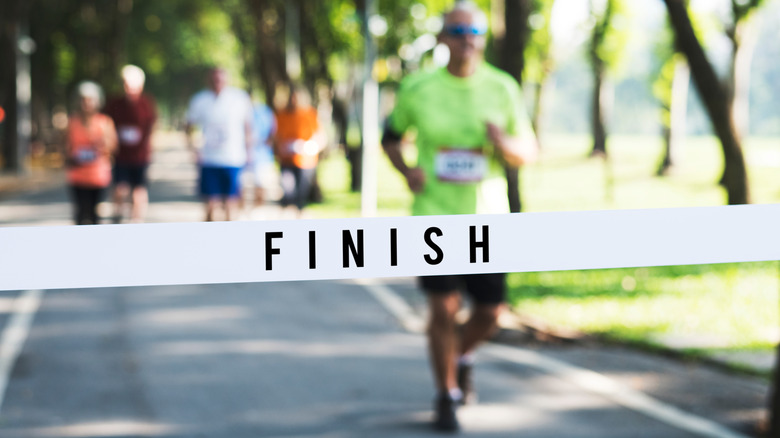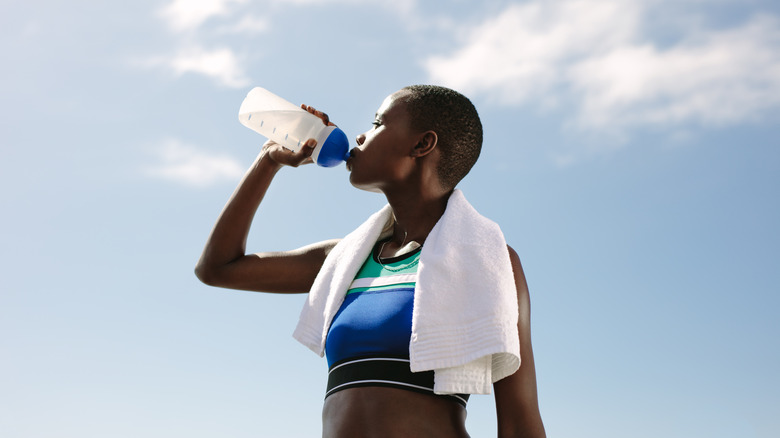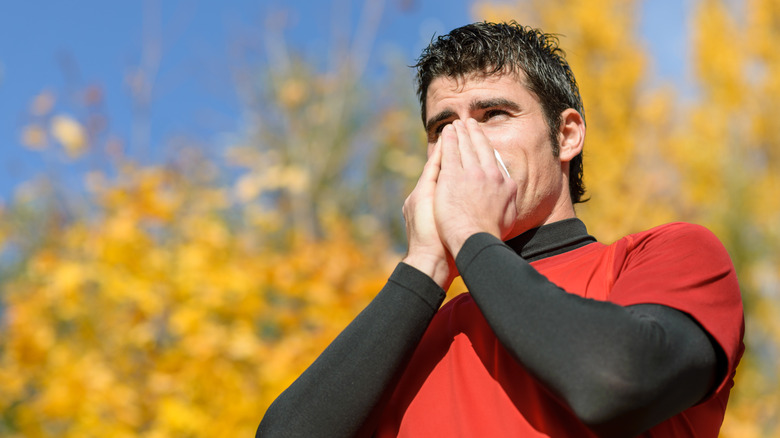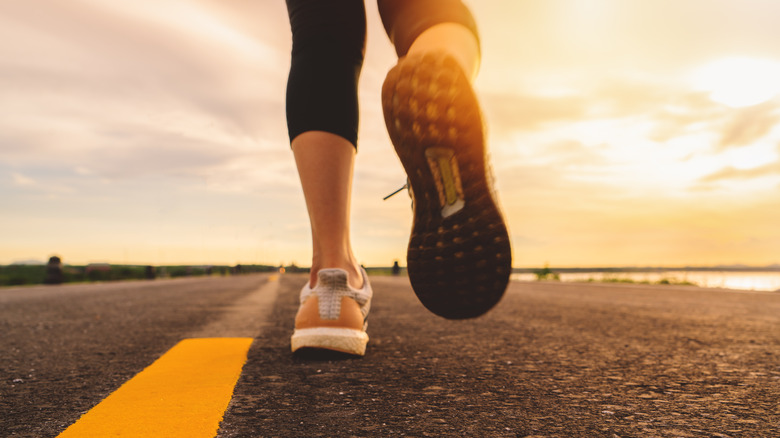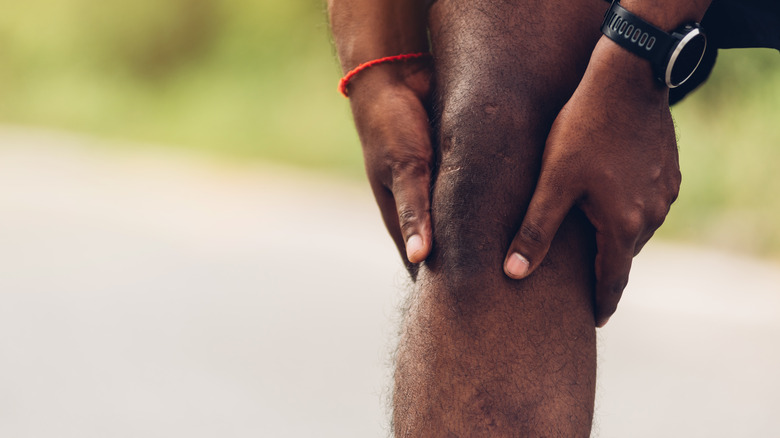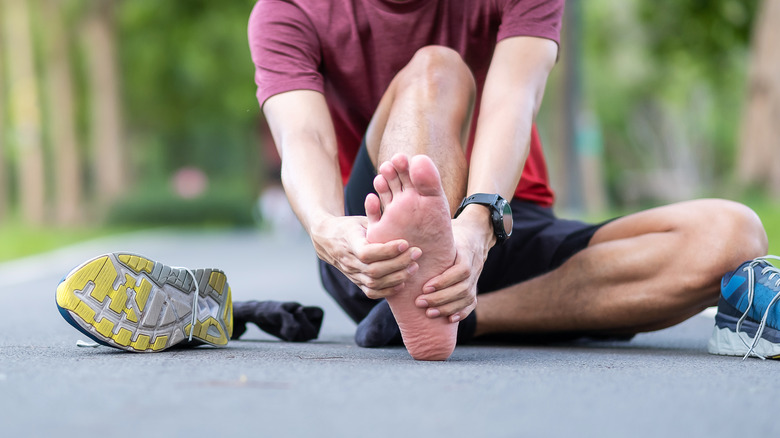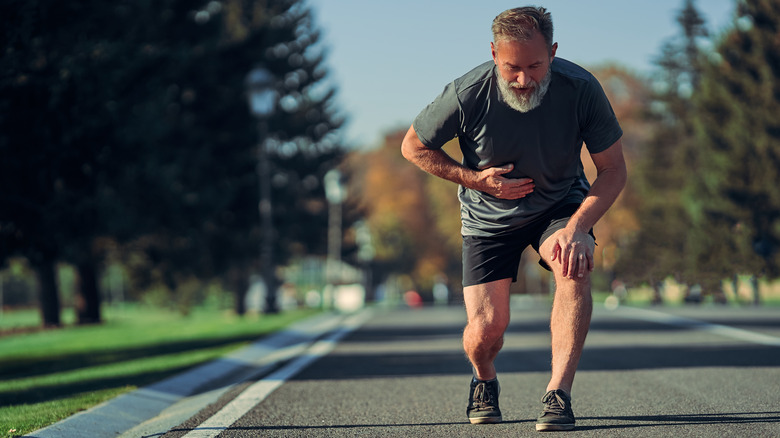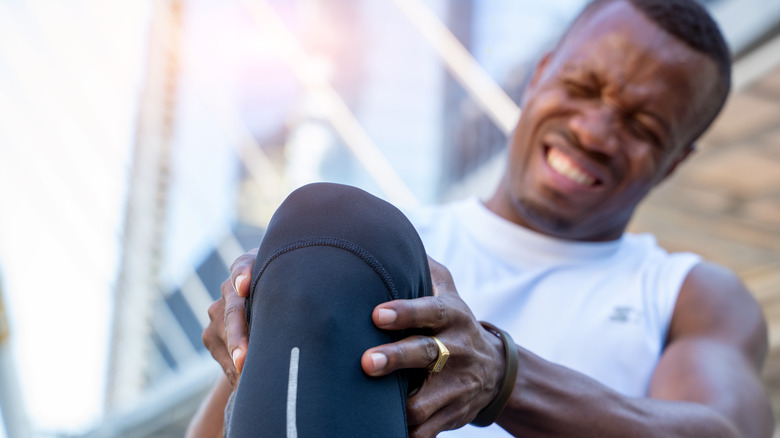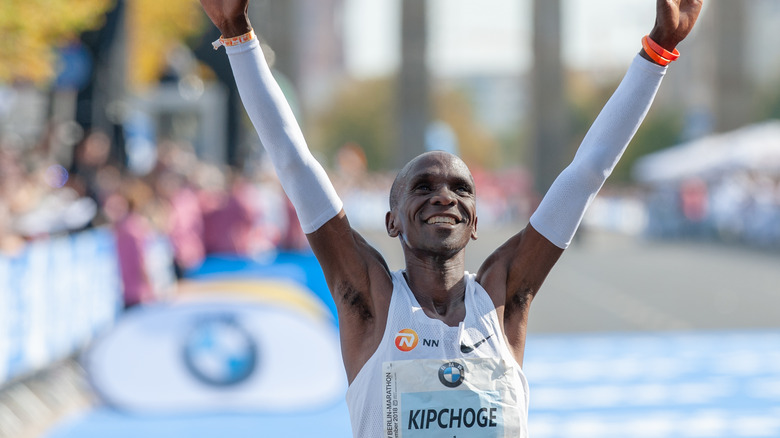When You Run A Marathon, This Is What Happens To Your Body
Running a marathon can be an invigorating, albeit challenging, endeavor. For many people, taking part in a marathon is considered the ultimate achievement — an almost-spiritual experience for some (via The New Yorker). Pushing past the physical and mental agony can serve as a metaphor for enduring and overcoming life's hurdles and obstacles.
Studies have shown that the human physique is essentially primed for long-distance running, which has helped people live healthier and happier lives for millions of years. But a 26.2-mile race is by no means a simple feat. Besides the psychological and emotional effects of both training and competing in a race, a marathon can take a pretty tough toll on you physically, as revealed in a 2021 Journal of Applied Physiology study.
From unfortunate pains to the runner's high, the body undergoes a whirlwind of changes as you stagger towards the finish line. Here, we take a look at some things you can expect when running a marathon.
Some research indicates your immune system takes a battering
It's common knowledge that regular exercise is an important aspect of a healthy lifestyle (via Centers for Disease Control and Prevention). It's often touted as an antidote to mental health difficulties like anxiety and depression as well as being prescribed for physical ailments, such as heart disease, diabetes, and obesity. On the other hand, strenuous and prolonged exercise like marathon running has been said to have a deleterious impact on our health, according to scientific research, due to the tumultuous toll it takes on the immune system.
A literature review showed that long-distance running temporarily weakens immune health. Unlike light or moderate exercise, endurance exercise impairs immune functions like plasma glutamine concentration and killer cell activity, increasing your risk of infections and illnesses like the common cold. An earlier study found that marathon runners were more susceptible to respiratory illnesses after a race than those who led a sedentary lifestyle, while another study highlighted that marathon runners have six times more infections and respiratory illnesses after a race than non-runners.
These findings are supported by a 2020 study of the immune response of endurance athlete and world record-breaker Colin O'Brady. It concluded that O'Brady had a severe state of "dysfunctional immune response" during the last month of his trek across Antarctica, when his energy expenditure was at its highest and he was undergoing a sustained period of mental and physical distress (via Women's Running).
But could your immune system actually be strengthened?
A 2018 review study titled "Debunking the Myth of Exercise-Induced Immune Suppression" looked at more than three decades of research, reporting that long-distance running actually had the potential to boost immune function and enhance health, thus challenging the longstanding belief that marathon running depletes the immune system.
The Conversation explained that "exercise does have a profound effect on immunity, but we now know that these changes have been misinterpreted." They admitted that some studies reveal a majority of symptoms experienced by runners after marathons are allergies as opposed to viral infections.
Exercise stimulates the release of adrenaline, which increases heart rate and blood flow in the body (via Runner's World). White blood cells, which are the disease-fighting immune cells, circulate the body more rapidly in order to detect any potential illnesses. Once exercise has finished, these cells decrease substantially. Historically, it's been concluded that the fall in immune cells creates an "open window" for infections, making people more vulnerable to getting sick, gastroenterologist Caroline Jouhourian explained to Runner's World. But some researchers argue that the adaptive immune system shows signs of strengthening in the long term.
You become dehydrated
Dehydration is an inevitable consequence of marathon running. The body can only handle so much heat or loss of water before it begins to struggle (via Runner's World). Although runners top up on water throughout a race, this doesn't sufficiently replace the fluid they lose through sweating because of the time it takes for water to travel through the digestive system and into the bloodstream. A 2011 study revealed that 70% of runners felt their performance was compromised by dehydration, while 45% perceived dehydration to trigger adverse health effects.
The body produces sweat to cool down the heat that's created by the muscles during physical activity. If those fluids aren't being replaced by water or sports drinks (which contain electrolytes), glycogen stores will be quickly depleted and your heart will start to work extra hard, increasing your risk of heat stroke, reports Runner's World. Most experts concede that fluid loss of more than 2% body weight can affect running performance in hot weather, with 3 to 5% loss in cooler temperatures, which is why runners should stay hydrated before, during, and after a race.
However, overhydrating – also known as hyponatremia — can be equally as dangerous as not drinking enough. Flooding the body with fluid causes the sodium concentration in the blood to dip to abnormally low levels. The excess water is then absorbed by the cells, causing swelling in the brain, which can result in seizures, coma, and even death (via Mayo Clinic).
The kidneys are strained
Marathoners are often cited as some of the healthiest people on the planet (via Quartz). Yet, it's believed that the various aches, pains, and injuries endured throughout a marathon ultimately add up to significant trauma. Besides doing a number on your muscles, bones, and heart, a marathon can temporarily wreck your kidneys.
A 2017 study revealed that 82% of runners who had been racing for at least five years demonstrated acute kidney injuries that resembled that of patients who'd undergone cardiac surgery or a kidney transplant. Blood and urine samples collected post-race contained high levels of inflammatory proteins and creatine (which helps muscles produce energy), indicating kidney damage.
This could be due to a number of reasons, according to Chirag Parikh, Yale nephrologist and the lead study author (via Quartz). Dehydration puts a massive strain on the kidneys, while running increases the body's core temperature, yielding inflammation and breaking down the muscles. These changes trigger the release of proteins that need to be flushed out of the bloodstream, kicking the kidneys into overdrive. And it isn't just the kidneys that suffer; other markers of organ trauma include a drop in electrolytes, bloody urine, severely low sodium levels, and a wiped out immune system (via Discover).
The good news is that any impairment to the kidneys appears to clear up within a day or two of a race, Dr. Parikh told The Atlantic, adding that it's possible for small doses of inflammation to make the organs stronger in the long term.
Glucose levels drop
Blood sugar (glucose) is a primary source of energy for our body (via Healthline). It comes from what we eat and drink. The pancreas releases insulin, which helps transport blood sugar into the cells for fuel production, in turn lowering glucose levels. When blood sugar levels are low, insulin levels drop in order to reduce the risk of high blood sugar.
Blood sugar generally drops after high-intensity exercise like marathon running and remains low for up to 48 hours, Sharon Movsas, a diabetes nutrition specialist, explained to Runnerclick. This is because the body needs extra energy for the muscles to function. This causes the muscles to grow sensitive to insulin and absorb more glucose from the blood. At about the 20-mile point, glucose levels start to dip massively and carbohydrate stores are almost entirely empty (via The Guardian). This is when running gets especially tough. Your body may start to send you repeated distress signals and many runners hit the infamous "wall."
A study published in the European Journal of Sport Science found that athletes who had a low glycemic index (GI) meal two hours prior to a race performed faster than those who consumed a high GI meal. It's believed that low GI foods cause smaller fluctuations in blood sugar levels, causing less disruption to hormonal balance when compared to high GI foods.
Your nose starts to run
A snotty nose is a fairly common side effect of marathon running (via Verywell Health). A study published in the journal Annals of Allergy, Asthma and Immunology found that exercise-induced rhinitis, also known as runner's hay fever, occurs in many people who take part in endurance exercise, even those who don't typically suffer from allergies. Plus, an earlier study revealed that up to 56% of runners get a runny nose while competing for long periods of time.
Allergic exercise-induced rhinitis is thought to be caused by air flowing in through the nose at a rapid rate due to the body's increased demand for oxygen (via Verywell Health). The cells within the nasal passages then become inflamed and respond to this influx of air by producing mucus, which is accompanied by a watery discharge that dribbles out of your nostrils while running.
According to Livestrong, over-the-counter nasal sprays and decongestants can help if this condition becomes bothersome. "These can have side effects, though," the site cautioned, "so talk to your doctor about what might be best for you."
You become (temporarily) shorter
As bizarre as it may sound, running a marathon can make you temporarily shrink. In fact, you can expect to lose up to a half-inch in height after a race (via Outside). This all comes down to the disks in your spine, which are put under considerable pressure with each stride, says a 2011 study published in the Journal of International Medical Research. The researchers looked at the spines of long-distance runners before and after a one-hour run and discovered that their disc height had significantly decreased. Another 2012 study found that even a 30-minute run at moderate intensity can result in a loss in disc height by about 6.3 %.
This stems from the fact that the intervertebral discs are largely composed of water. When compressed, the fluid leaks through the disc wall, causing a reduction in height and volume — and a reduction in height overall, since the discs comprise one-third of your spinal column (via Outside). But fret not — this change is temporary. When people stop running and give their bodies a rest, the discs regain fluid and are restored to their original size. And luckily, there doesn't appear to be a link between disc reduction and impaired disc health, according to research.
Will running a marathon damage your knees?
Running a marathon puts immense physical strain on your body. The repeated pounding of your feet as they hit the ground with each stride may have quite an effect on your knees, resulting in injury (via Sports-health). The pressure applied to the knees is equal to approximately three times your body weight when walking and five times when jogging.
But before you feel too guilty for putting your knees through hell, you might be pleased to find out that some studies have questioned the negative impact of marathons on the joints. On the contrary, it's been suggested that marathon running could be protective for your knees. In the same way that it can make your bones and muscles stronger, it can bolster the cartilage in the knee, which acts as a protective cushion between bones at the joints (via Runner's World).
One 2019 study published in BMJ Open Sport & Exercise Medicine found that marathon running improved knee joint health in middle-aged runners, even when the joints suffered some slight damage. Another 2017 study showed that runners are less likely to develop osteoarthritis, dispelling the myth that running is detrimental to the knees and results in ravaged joints.
Your muscles are damaged
Whether you're a rookie or a seasoned marathoner, you're likely to suffer from some muscle wear and tear throughout a marathon. According to 2020 research, marathon races induce muscle damage in the lower extremity muscles in particular. "Your tissues are asked to do something that they're not normally asked to do at that speed at that number of repetitions at that distance," Neil Black, head of physiotherapy at the English Institute of Sport, said to The Guardian.
The impact of each running stride landing causes damage to the muscle tissue; proteins like myoglobin then seep into the bloodstream through these microscopic tears (via The Guardian). "The body's defence mechanism will see these tears as damaged tissue and will set up an inflammatory response," Clyde Williams, a physiologist at Loughborough University, explained. As a result, free radicals are released, attacking the damaged areas. This underlies muscle tightness and post-race soreness.
Full recovery might take you a few weeks — this will depend on various factors, such as the amount of time you spent training, your level of fitness to begin with, and the severity of injuries caused while competing. "A lot of people, after a week, feel reasonably well recovered but it would be very unlikely they truly had recovered at a physiological level," Black revealed.
You get blisters on your feet
Heinous foot blisters are another unfortunate marathon malady. A bit like chafing, this is caused by friction between the sock, shoe, and skin of your feet, explains a 2018 study. The repetitive rubbing causes the upper layers of the skin to separate from the bottom layers, creating pockets filled with clear watery fluid that's similar to plasma (via Medical News Today). Excessive moisture caused by sweating increases your vulnerability to friction and blisters by dampening the skin.
Some of the most common exacerbators of this problem include wearing cotton socks, doubling up on socks, and running shoes that are too small, or equally, shoes that are ill-fitted, reported Self. "The main problem after blister formation is pain," James Koo, physical therapy supervisor at NYU Langone's Sports Performance Center, told the publication. In response to the pain caused by a blister, some runners develop "compensatory movement strategies," which involves changing their gait to avoid pressing on the blister, according to Koo. This can hinder their performance but more importantly, it can lead to an injury.
Your bowel movements change
Runner's diarrhea is a pretty unfortunate byproduct of marathon running (via Mayo Clinic). Research estimates that 30 to 50% of distance runners will encounter gastrointestinal problems during a race, ranging from nausea to gas pains to diarrhea. "Let's just say that anyone who considers themselves a runner will likely admit to having runner's diarrhea at some point in time," Amy S. Oxentenko, a gastroenterologist and professor of medicine at the Mayo Clinic, told Self.
There are many potential causes of runner's diarrhea. It may stem from your organs being jostled and sloshed around for hours at a time, explained the Mayo Clinic. A 2014 review study also cited reduced blood flow to the intestines, increased breathing rates, and drinking bottled water as potential contributors, since these activities create more air in the stomach.
Another common factor is what you eat — either before or during a run, registered dietitian Lydia Nader told Self. High-fat foods are possible culprits because it takes longer for your body to digest them than it does protein and carbs, while high-fiber foods, like bran, legumes, and certain fruits and vegetables, produce gas and bloating, which can bring on the urge to go. Coffee and caffeinated drinks stimulate muscle movement and speed up the transit of food in the digestive tract, Oxentenko added. Sadly, there are few strategies that are guaranteed to curb the trots during a race but it's often recommended that runners avoid hard-to-digest meals prior to a marathon (via Popular Science).
Your legs start to burn
Most marathoners are all-too-familiar with that long-feared burning sensation in their shins and quads (via Livestrong). It often strikes around the middle or end of a race. And the faster you run to shake it off, the more intense it tends to get. It can become an annoyance like no other,
This is often due to lactic acid, a natural byproduct of your body burning glycogen without oxygen when you run (via Active). When your muscles undergo an intense workout, your body doesn't always produce enough energy through oxygen. Instead, glycogen breaks down into lactate and hydrogen ions in the blood. Excess lactate can quickly build up in your bloodstream since your body will produce it quicker than it's used. The lactate is then processed and converted into fuel by the mitochondria in your cells, whereas the hydrogen ions turn your blood more acidic, making it difficult for your muscles to contract as they usually do. As a result, your legs grow heavier and more fatigued and this is where lactic acid creeps in.
Some people get acid reflux
Lactic acid can be pretty distracting in the midst of a marathon. The burning feeling in the center of your chest, on the other hand, will not only hinder your performance but makes it increasingly difficult to get through a race (via Self).
"Acid reflux happens when partially digested food, stomach acids, and digestive enzymes travel 'uphill' into the esophagus," Susan Besser, a family medicine expert, told Runner's World. Under normal circumstances, the lower esophageal sphincter, located between the esophagus and stomach, closes off once food or liquid has moved through to the stomach. But if this muscle is weak or relaxed, acid escapes from the stomach into the esophagus. "The lining of the esophagus isn't as sturdy as the stomach lining and can't handle acid as well," Besser added, resulting in a burning sensation in the chest area. People may also get a lump in their throat, start to cough, or feel nauseous.
Not everyone gets acid reflux while running. Some people are more prone to it than others. "Exercise can cause greater intra-abdominal pressure, leading to greater reflux and acid reflux-related symptoms during or after running," Sri Komanduri, a gastroenterologist at Northwestern Memorial Hospital, also told the publication. The bouncing and shaking that naturally happens when you run stimulates the lower esophageal sphincter, allowing stomach contents to make their way up.
Some runners feel euphoric
From signing up to crossing the finishing line, a marathon can put you through a wave of emotions. But at some point during a race when your aches and pains have dissipated, anxiety and suffering might morph into a delightful feeling of euphoria or a state of sheer calmness, also known as the elusive and mysterious "runner's high" (via Self). The phenomenon may seem confusing to non-runners. Equally, those who've never experienced the "high" during a run may be left questioning how something almost torturous at times could feel so good.
It was once hypothesized that endorphins are the brain's "feel-good" chemicals responsible for the runner's high, per Self. But more recent research argues that endorphins are unlikely to have such rapid effects on the brain since they're too big to quickly make it through the blood-brain barrier. According to a 2015 study, endocannabinoids are another type of chemical that's released during a run, inducing a similar euphoric effect as marijuana. The evolutionary explanation for this is that the endocannabinoid system is activated to help us cope and get through a challenging undertaking like a marathon, which, back in the day, might have involved hunting for food and escaping predators instead.
"What [research is showing] with the runner's high is that we're most conducive to experiencing it if we do a long, continuous bout of exercise, generally one that's rhythmical," Paul J. Arciero, a professor at Skidmore College, told Self.

